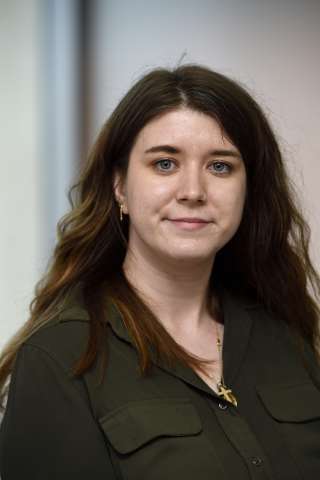
Tackling the Root Causes of Addiction: Q&A with Bloomberg Fellow Joanna Mlicka-Anderko
March 19, 2019
Joanna Mlicka-Anderko says that people often do a double take when she explains that she works for the United States Drug Enforcement Administration because they know it primarily as a law enforcement agency. But she’s not a law enforcement officer; rather, she works as a demand reduction specialist, reducing illicit drug use through education and other preventive practices. “Our demand reduction team is very small but mighty, and we have the opportunity to show people that might have a negative opinion about law enforcement that we are doing work for the community,” she says.
Meaningful prevention work means tackling addiction and substance use and misuse at the root, Joanna adds. She and her team are developing new ways to accomplish this goal, by collaborating with community coalitions, government agencies, and non-profits that work in prevention and treatment, and learning along the way what works and what doesn’t work. Funded and led by ten regional High Intensity Drug Trafficking Areas programs and the Centers for Disease Control and Prevention, the Heroin Response Strategy initiative that Joanna works in exists at the intersection of city, state, and federal government, with team members sitting at more than 30 agencies around the country.
We spoke with Joanna about her instrumental work with the Newark Cares program, which aims to reduce the impact of adverse childhood experiences, and how she hopes to use her public health training to make Newark a trauma-informed city.
What drives you, and how did this bring you to your interest in public health?
Ambition drives me to do the work that I do. My job title is “demand reduction specialist,” which means I work to reduce the demand for drugs. It’s a very broad definition, and at first glance it can seem overwhelming. Ambition is responsible for my passion and my drive, and it allows me to work hard to accomplish this challenging job.
What public-health related work have you done that you’re most proud of?
I have worked for more than three years with the High Intensity Drug Trafficking Areas (HIDTA) and Drug Enforcement Administration. One of the projects that I am most proud of is implementing the Cares program in Newark. This program addresses the impact of adverse childhood experiences, or ACEs, by creating a protocol where the police have to fill out a form if they are on the scene of an incident where children are present. The form then gets sent to the child’s school, where the staff can keep an eye on that child. This program has been piloted in the city of Newark, and we are expanding it in other cities and towns across New Jersey.
What question or problem in your community keeps you up at night?
How can we help make Newark a trauma-informed city? Understanding the problem is a crucial first step in creating an action plan to tackle this massive problem, so we need to research trauma in Newark before we begin to implement programs that address it.
There are several roadblocks for me to help solve this big problem, such as cultural competency and trust within the community, because I am not from Newark and I represent a federal law enforcement agency. These two factors make my work more challenging, but ambition and humility drive me to take on these challenges head on.
How is the Bloomberg Fellows Program helping you to tackle that problem? What impact do you hope you to make as a Bloomberg Fellow?
I look at the Bloomberg Fellows program as providing a new pair of glasses that allows me to view my work through the lens of public health. I went to school for criminal justice and landed my dream job at HIDTA/DEA, but there really is no formal training for this role. Being a Bloomberg Fellow will give me the theoretical framework and training that I need to look at my role differently, which will allow me to approach this and other problems in a different way.
Connect With Us
Receive all the latest news from the Initiative by signing up for the American Health Dispatch newsletter, subscribing to the American Health Podcast, and subscribing to our YouTube channel.
Contact Us